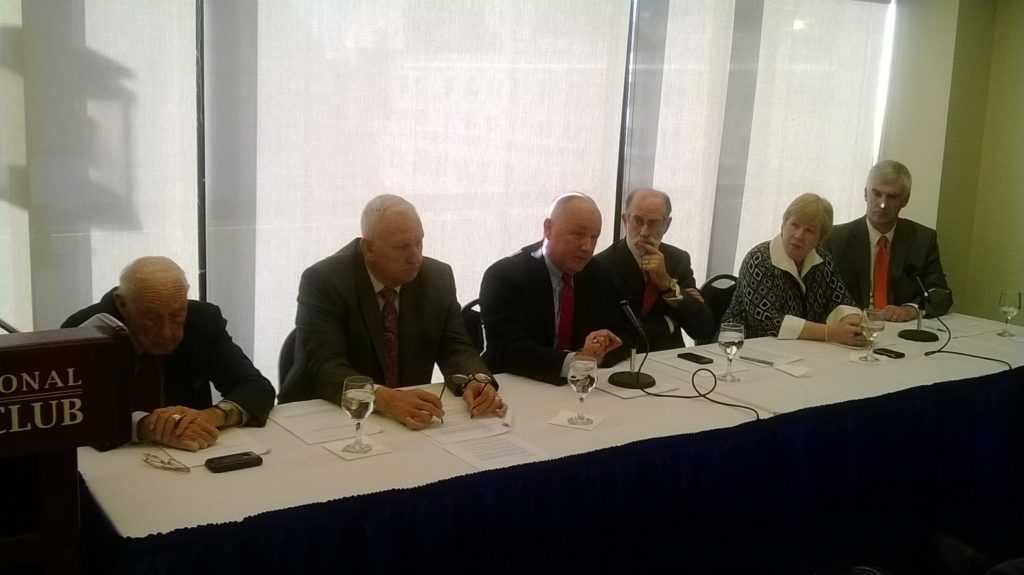Senior National Security, Intelligence Professionals Warn President Obama Against Damaging U.S. Collection Sources and Methods

MEDIA ADVISORY
For Immediate Release
For more information contact:
Alex VanNess
[email protected]
(202) 719-2421
Senior National Security, Intelligence Professionals Warn President Obama Against Damaging U.S. Collection Sources and Methods
Washington, D.C.: Seventeen former senior members of the U.S. intelligence and defense communities released today an open letter. they sent to President Obama on the eve of a presidential address in which he is expected to unveil changes to current intelligence collection policies, practices and programs. Among the signatories were: former Attorney General Michael Mukasey, former CIA Directors James Woolsey and Michael Hayden, former Homeland Security Advisor to the President Fran Townsend, former National Counterintelligence Executive Michelle Van Cleave and the former chairman of the House Intelligence Committee, Rep. Pete Hoekstra.
Five of the signatories participated this afternoon in a National Press Club press conference sponsored by the Center for Security Policy The event featured remarks by: Congressman Hoekstra, Lt. Gen. William “Jerry” Boykin, U.S. Army (Ret.), former Deputy Undersecretary of Defense for Intelligence; Admiral James “Ace” Lyons U.S. Navy (Ret.), former Deputy Chief of Naval Operations and Commander of the Pacific Fleet; and Center for Security Policy Senior Fellows Fred Fleitz and Clare Lopez. The Center’s president, Frank J. Gaffney, Jr. who formerly acted as an Assistant Secretary of Defense, moderated the program.
The participants discussed in some detail the findings and recommendations of an Independent Review Commission tasked by President Obama with evaluating National Security Agency and other intelligence collection capabilities. They were the subject of a damning new study by Mr. Fleitz and Ms. Lopez entitled, “A Critique of the Recommendations by the President’s Review Group on Intelligence and Communication Technologies”. Press reports suggest that at least some of the Commission’s problematic inputs may be adopted by the President tomorrow.
The following were among the highlights of the briefers’ comments:
Rep. Hoekstra observed that: “Intelligence is the tip of the spear to keep America safe. We need a robust intelligence community to fight and combat the kind of threat that America faces today.”
Lt. Gen. William “Jerry” Boykin characterized the threats being mounted by al Qaeda and the Muslim Brotherhood as those of “a serious, sophisticated adversary and they do pose an existential threat to very future of America.”
Ms. Lopez amplified on the threat by noting that: “These adversaries are not just highly educated, very tech savvy, very sophisticated. But they are interconnected in a way that was not the case perhaps even 10 or 4 years ago.”
Fred Fleitz emphasized the importance of “big data” to U.S. intelligence collection requirements and capabilities, noting: “The [President’s] Review Group treats big data in a very negative way,” urging that “we have to better study what big data can accomplish to promote our national security”.
Admiral James “Ace” Lyons, said: “If I were a member of Al-Qaeda…I’d tell you to go out and endorse every one of the Presidential Review Group’s recommendations….I don’t see where any of these enhance the security of the American public or this great country”.
The open letter suggests a set of six principles to guide efforts at improving America’s vital intelligence collection capabilities, while preserving Americans’ constitutionally protected privacy rights:
- In a world that is every bit as dangerous as that of the immediate pre-9/11 period, a superior intelligence capability is the critical first line of defense in keeping our country safe.
- U.S. intelligence is an institution subject to the checks and balances of the Constitution, which includes strong – and bipartisan – oversight of the intelligence community by the executive branch, the Congress and the courts.
- U.S. intelligence programs must respect and protect American civil liberties.
- U.S. citizens and people residing within the United States have constitutional protections with regard to privacy and civil liberties. Those rights do not, and must not, extend to non-U.S. persons abroad – who have none of the duties or obligations of citizens or residents.
- Legitimate whistle-blowers can make an indispensable contribution to effective oversight and deserve appropriate legal protections.
- U.S. businesses should not be subjected to undue burdens (either bureaucratic or competitive) in the course of cooperation with U.S. government entities engaged in intelligence collection against foreign threats.
The full Center for Security Policy report is available here: /wp-content/uploads/2014/01/NSA_report.pdf
-30-
- LIVE NOW – Weaponization of US Government Symposium - April 9, 2024
- CSP author of “Big Intel” is American Thought Leaders guest on Epoch TV - February 23, 2024
- Four weeks after release, Big Intel remains a #1 Amazon bestseller - February 13, 2024
